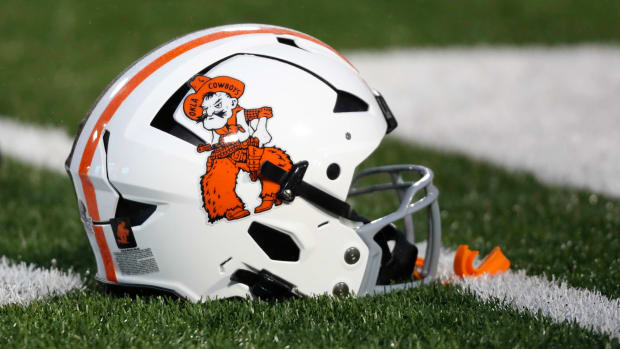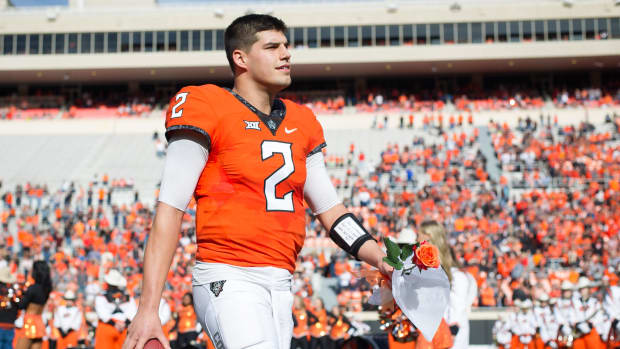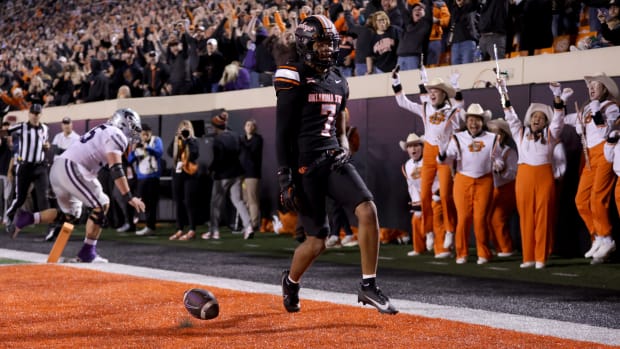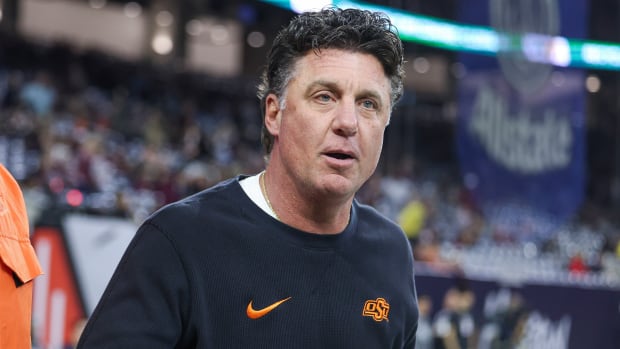Brent Guy Makes Major Revelation About His Mental Health
STILLWATER -- Oklahoma State's current Director of Football Relations and longtime college football assistant coach Johnny Barr knows Brent Guy well. When Barr came to Oklahoma State the first time in 1986 as an assistant for Pat Jones, Guy was his graduate assistant. Then in 1995 when Barr was coaching for Bob Simmons at Oklahoma State he suggested Simmons bring Guy in as the linebackers coach. It was Guy's second tour of duty at Oklahoma State. His third if you counted is playing days as a walk-on turned scholarship defensive end and linebacker out of Booker, Texas. Barr's wife and Guy's wife are good friends. Until about six months ago, Barr didn't know the secret that Guy shared through ESPN's Ivan Maisel on Tuesday, May 26. Guy has coached his entire career hiding and fighting through bipolar disorder.
The term bipolar disorder gets tossed around a lot in society, so before going any further I thought it would be prudent to get a definition from an authority like the National Institute of Mental Health. They define bipolar disorder this way:
Bipolar disorder (formerly called manic-depressive illness or manic depression) is a mental disorder that causes unusual shifts in mood, energy, activity levels, concentration, and the ability to carry out day-to-day tasks.
There are three types of bipolar disorder. All three types involve clear changes in mood, energy, and activity levels. These moods range from periods of extremely “up,” elated, irritable, or energized behavior (known as manic episodes) to very “down,” sad, indifferent, or hopeless periods (known as depressive episodes). Less severe manic periods are known as hypomanic episodes.
Guy played for Oklahoma State and was a fearless player on special teams and at a time under head coach Jimmy Johnson when Oklahoma State had fewer players because of NCAA probation. Guy moved into a regular role starting on defense and earned a scholarship. He had 177 tackles in his career and 103 in his senior season.
After trying a career outside of football, Guy was back in when his former position coach and now the Oklahoma State head coach Pat Jones brought him on as a graduate assistant. Guy would first serve as recruiting coordinator off the field in 1988 and then became a full-time position coach (linebackers) in 1989. It was during that time that Maisel's article and Guy's admission says the bipolar disorder first appeared. It was Jones, now a radio talk show personality in Tulsa that felt something was wrong.
Guy had basically stopped sleeping at night and would get up early and go to the football office. Finally in a staff meeting one day, Jones recognized there was an issue.
"It started peaking on me," Guy said in the article. "When I say 'peaking,' I was starting to have hallucinations."
Maisel wrote: During the meeting, Guy saw a battle breaking out, a fight of good versus evil enveloping his fellow coaches.
"In my mind," he said, "I could look in your eyes, and I could tell: Are you on this side or that side? I looked around the room, and I was making notes of who was in, who was out. I started trying to pull in the people that I thought were on the good side. I started trying to give a lecture. I was just making no sense at all."
Maisel wrote: Jones told everyone but Guy and the strength coach (then and now), Rob Glass, to leave the meeting room.
"I knew it was bizarre," Jones said. "I knew there was something going on that was not normal. It wasn't any kind of wild fit. He was just babbling nonsense."
That was the start as Guy saw a doctor and the process went on from there. It was Glass that Pat Jones had drive Guy to see the doctor. It started the treatment process that has gone on for some 30-years.
Guy recently retired from coaching after being a head coach at Utah State and coaching at Boise State, Arizona State, Louisville, UNLV, Tulsa, Memphis, and most recently as defensive coordinator at Florida International for one of his former coaches under Johnson at Oklahoma State, Butch Davis.
The story by Maisel is an amazing one that shows the strength of Guy to persevere and that his partner in helping him deal with his issues was his wife Shawn. She was by his side through the very tough times and fortunately, some very good times in his coaching career. His story is amazing.
One of the aspects of keeping it a secret during his coaching career was when he would hear of somebody else dealing with it.
"You know, it would come up in staff meeting that one of the players was having difficulty. It might be a player or just someone at the University and I would wonder if I could have helped them," Guy explained. "That would bother me."
It doesn't any longer as Guy is speaking to groups, especially groups of students about his issues and advise on how to get help and how to deal with a mental health issue.
It took a lot to hide that and keep it secret while coaching, but the bravery is maybe reaching a new positive height now that Brent Guy is sharing his battle.



